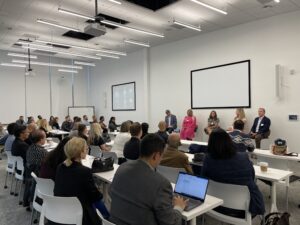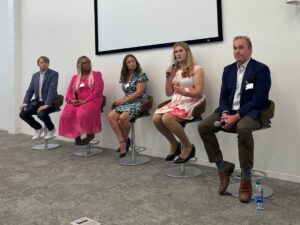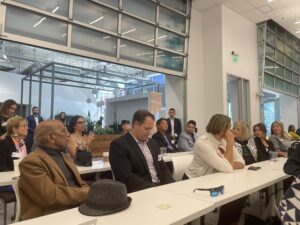 June 8, 2023 – The LAEDC’s Future Forum, as part of LA Tech Week 2023, centered on the power of technology in driving innovation and building an equitable economy. New technologies, such as digital platforms, artificial intelligence, and big data analytics, have the potential to revolutionize economic development. They can improve access to information, services, and workforce opportunities for marginalized communities, bypassing traditional barriers like physical distance or lack of funding. By harnessing technology’s potential, the aim is to create more inclusive and sustainable economies that benefit everyone.
June 8, 2023 – The LAEDC’s Future Forum, as part of LA Tech Week 2023, centered on the power of technology in driving innovation and building an equitable economy. New technologies, such as digital platforms, artificial intelligence, and big data analytics, have the potential to revolutionize economic development. They can improve access to information, services, and workforce opportunities for marginalized communities, bypassing traditional barriers like physical distance or lack of funding. By harnessing technology’s potential, the aim is to create more inclusive and sustainable economies that benefit everyone.
Stephen Cheung, President and CEO of the LAEDC, and Chris Manriquez, Vice President for Information Technology and Chief Information Officer of California State University Dominguez Hills, also welcomed the participants. Mr. Manriquez highlighted the university’s commitment to transformative education, community collaboration, and technological advancements. Mr. Manriquez stressed the importance of technology and its role in shaping the future economy, emphasizing the need for critical thought, education, and regional cooperation.
Jessica Ku Kim, Chief Deputy of the Los Angeles County Department of Economic Opportunity, represented the newly formed department, which aims to deepen economic and workforce development services. During her keynote, Ms. Kim emphasized the significance of technology in the digital economy, highlighting the impact of technology during the pandemic. She acknowledged the resilience of high-skill, high-wage jobs and the challenges faced by marginalized communities due to the digital divide.
Ms. Kim discussed the department’s focus on supporting local businesses, investing in employers that offer living wages and career advancement opportunities. The County aims to build resources and partnerships to promote equitable capital access. The department also recognized the importance of workforce development, ensuring individuals had the necessary skills for rapidly changing technology-driven industries. Kim encouraged employer partnerships and participation in regional discussions to meet the demands of a fast-changing economy. She mentioned LA County’s investment in technological infrastructure, including a worker and business portal to simplify access to resources. The department also planned to invest in digital navigators and resources for communities with limited digital literacy and access. Kim emphasized the need for collective investment in socio-economic empowerment, particularly in disinvested communities.
Ms. Kim expressed the County’s commitment to making impactful investments, working with partners, and delivering services to the community. She invited participants to connect with her and the department for further collaboration.

The Future Forum featured a panelist discussion with:
- Mandi Cohen, Managing Director, Deloitte
- Valorie Jones, CTO, Storyfile
- Krystal Rawls – Director, Workforce Integration Network (WIN), CSUDH
- Tim Ryder, General Manager, Microsoft
- Moderator: Todd Terrazas, President, A LA Community
Mr. Terrazas opened the panel with a recent Goldman Sachs report stating that generative AI is expected to drive a significant increase in global GDP by up to 7 percent and productivity growth over the next decade. Generative AI can generate text, images, and other media, revolutionizing content creation, creativity, and productivity. However, it raises ethical concerns regarding quality, authenticity, and ownership of generated content. The panelists focused on harnessing AI’s positive potential while ensuring fairness, safety, and broad benefit.
Each panelist then introduced themselves and shared their perspectives on AI. Ms. Rawls emphasized the importance of collaboration across various sectors to ensure the successful implementation of AI. Ms. Cohen highlighted the need for effective regulation and governance to manage the risks associated with AI, drawing from lessons learned from the invention of the internet. Ms. Jones discussed the advancements in creating digital humans and their applications in fields like entertainment, education, and storytelling. And Mr. Ryder discussed the opportunities and challenges of AI in manufacturing, emphasizing the need to bridge the gap between skill requirements and workforce development.
The conversation then discussed the broader implications of AI, including bias in datasets and the importance of governance and ethics, such as those that were not present at the start of the Internet’s rollout. The panelists acknowledged the inherent biases in data and stressed the need for transparency, ethical policies, and human oversight in AI systems. They discussed the importance of organizations having robust ethics policies and being accountable for their data practices. There was an emphasis for the need to involve diverse perspectives and communities to address biases and ensure fair and inclusive outcomes.
Ms. Rawls acknowledged the digital divide and the importance of AI literacy for different populations. The participants discuss how certain communities lack access to devices and the internet, making using AI or even understanding its basic concepts challenging. They also highlight the prevalence of fearmongering and misinformation about AI in society, which hinders its adoption and creates unnecessary concerns. To address the digital divide, efforts are being made to provide computers, internet connectivity, and training materials in communities, ensuring that individuals who have never used a computer before can learn and ask questions without judgment.
The conversation further explored the need for diversity and inclusion in the development of AI models. The panelists emphasized that a wide range of people with different backgrounds and experiences should be involved in building AI models to identify biases and ensure fair representation. The democratization of AI training models is also discussed, making it accessible to individuals without the need for a supercomputer.
Within educational institutions, AI tools can act as personal tutors, assisting students in their assignments, prompting critical thinking, and providing access to information. Ms. Jones addressed concerns about the misuse of AI tools and the importance of maintaining a balance between using AI for assistance and developing essential skills such as math, coding, and creativity.
The participants expressed optimism about the potential of AI in education and its impact on productivity and job opportunities. They highlight the need to educate educators, challenge existing paradigms, and ensure equitable access to AI tools for all individuals. Ms. Rawls noted the transformative power of AI and the importance of responsible and inclusive implementation to bridge the gap between technology and society.

During our audience question period, a question was asked about the potential negative impact of AI on mental capabilities and social skills, such as how reliance on calculators and cell phones can lead to declining mathematical and interpersonal skills. However, our panel participants expressed a more optimistic view, emphasizing that while technology may lose or affect certain skills, AI also opens new opportunities and enhances productivity.
Ms. Cohen noted the importance of consciously taking breaks from technology and teaching younger generations the value of interpersonal skills. They suggest that AI can be used to train people in better communication and encourage technologies that bring people together rather than isolating them. Mr. Ryder spoke about the challenges faced in onboarding new employees during the COVID-19 pandemic and the importance of creating spaces for people to connect and experience company culture. The participants also highlighted the need to continuously reflect on what makes us human and find ways to foster connection and preserve our core humanity. Ms. Cohen highlighted the potential that the educational system might change, moving from technical skills to more interpersonal skills learning.
The overall sentiment is that humanity has always adapted to new technologies, and while there may be trade-offs, human connection and evolution will persist. Trusting in our ability to adapt and embracing the benefits of AI without demonizing it is seen as crucial.
Overall, the panel discussion provided insights into AI’s transformative potential, its challenges, and the importance of ethical considerations, governance, and collaboration to ensure the responsible and beneficial use of AI technology.